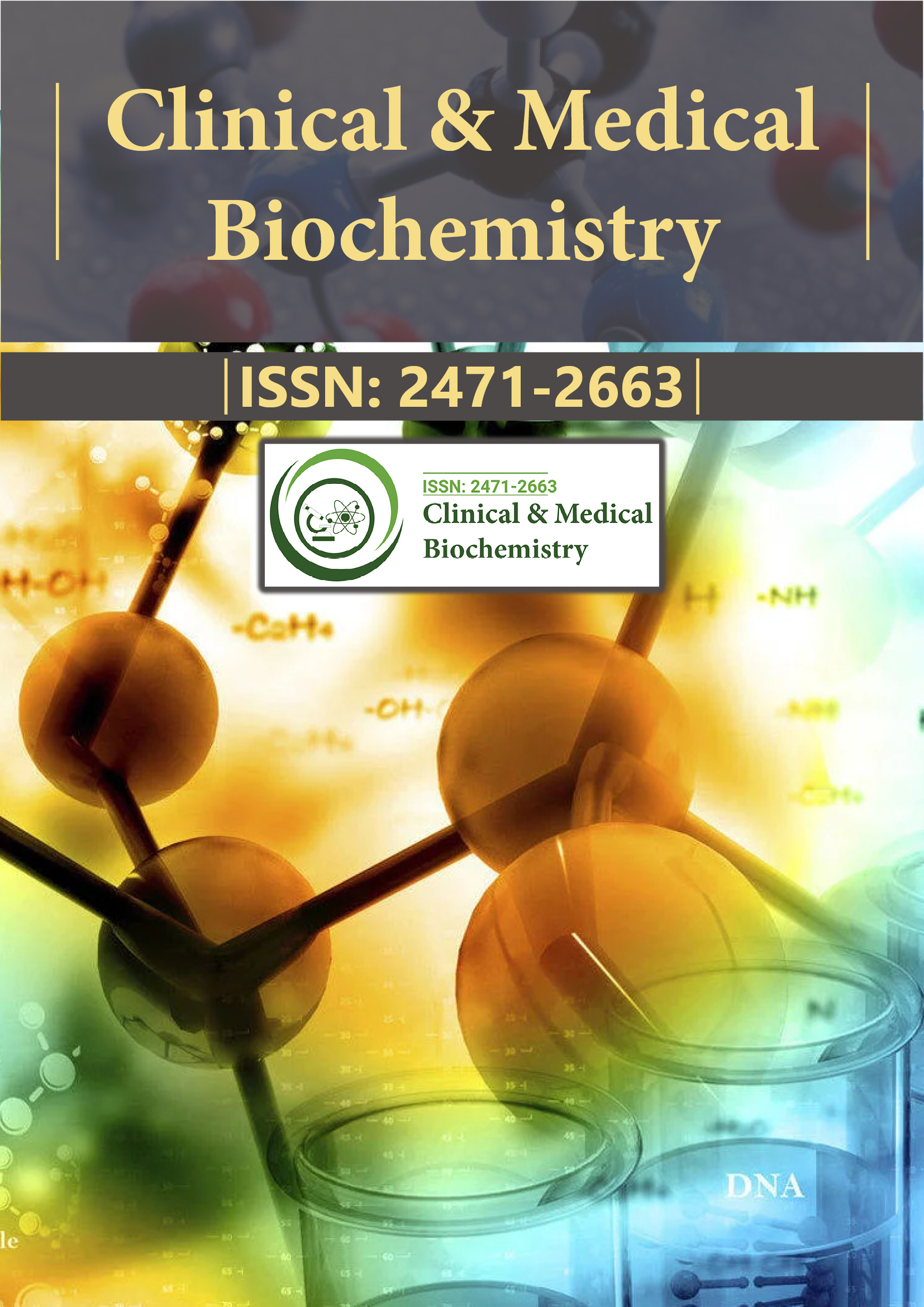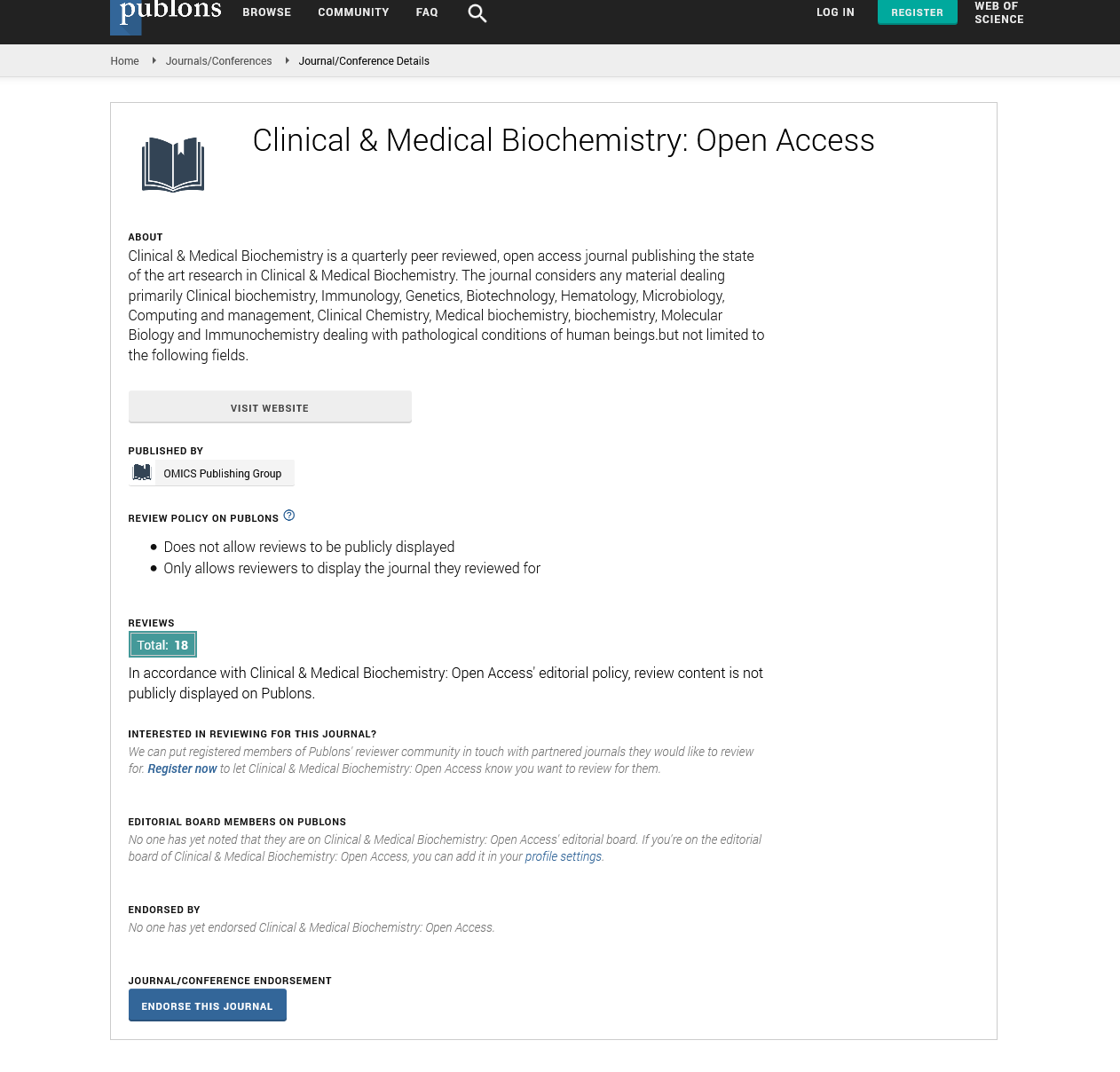Indexed In
- RefSeek
- Directory of Research Journal Indexing (DRJI)
- Hamdard University
- EBSCO A-Z
- OCLC- WorldCat
- Scholarsteer
- Publons
- Euro Pub
- Google Scholar
Useful Links
Share This Page
Journal Flyer

Open Access Journals
- Agri and Aquaculture
- Biochemistry
- Bioinformatics & Systems Biology
- Business & Management
- Chemistry
- Clinical Sciences
- Engineering
- Food & Nutrition
- General Science
- Genetics & Molecular Biology
- Immunology & Microbiology
- Medical Sciences
- Neuroscience & Psychology
- Nursing & Health Care
- Pharmaceutical Sciences
Perspective - (2025) Volume 11, Issue 2
Exploring Disease-Specific Conditions Including Diabetes, Causes, Consequences, and Management Strategies Worldwide
Anila Jaleel*Received: 30-Apr-2025, Manuscript No. CMBO-25-29630; Editor assigned: 02-May-2025, Pre QC No. CMBO-25-29630; Reviewed: 16-May-2025, QC No. CMBO-25-29630; Revised: 23-May-2025, Manuscript No. CMBO-25-29630; Published: 30-May-2025, DOI: 10.35841/2471-2663.25.11.253
Description
Chronic diseases such as diabetes, cardiovascular disease, cancer and respiratory illnesses represent some of the most pressing global health challenges of the 21st century. Among these, diabetes stands out as a rapidly growing epidemic with significant health, economic and social implications. Diabetes mellitus is a metabolic disorder characterized by chronic hyperglycemia resulting from either insufficient insulin production or impaired insulin utilization. It is broadly categorized into type 1 diabetes, type 2 diabetes, gestational diabetes and other specific types. Type 1 diabetes is an autoimmune condition that usually presents in childhood or adolescence and requires lifelong insulin therapy due to the destruction of pancreatic beta cells. Type 2 diabetes, the more common form, typically develops in adulthood and is closely associated with obesity, sedentary lifestyles and genetic predisposition. It is characterized by insulin resistance and relative insulin deficiency and can often be managed initially with lifestyle modifications and oral medications.
Uncontrolled diabetes can lead to a range of serious complications affecting multiple organ systems. Long-term hyperglycemia damages blood vessels and nerves, contributing to both microvascular complications such as diabetic retinopathy, nephropathy and neuropathy and macrovascular complications including heart disease, stroke and peripheral artery disease. Diabetic retinopathy is a leading cause of blindness in adults, while diabetic nephropathy can progress to end-stage renal disease requiring dialysis or transplantation. Diabetic neuropathy can cause pain, numbness and digestive issues and significantly increases the risk of foot ulcers and amputations. Cardiovascular complications are the leading cause of mortality in individuals with diabetes, making early detection and control of risk factors critical to improving outcomes.
In addition to diabetes, other disease-specific areas include hypertension, a condition characterized by consistently elevated blood pressure. It is a major risk factor for heart attack, stroke and kidney disease. Like diabetes, hypertension often remains asymptomatic until complications develop, which is why it is commonly referred to as a “silent killer.” Management involves lifestyle changes such as reduced salt intake, weight loss, regular exercise and the use of antihypertensive medications. Early diagnosis through routine screening and adherence to treatment are essential for preventing organ damage and reducing mortality.
Respiratory diseases like Chronic Obstructive Pulmonary Disease (COPD) and asthma also constitute significant disease-specific concerns. COPD is a progressive lung condition usually caused by long-term exposure to tobacco smoke or environmental pollutants. It leads to airflow limitation, chronic bronchitis and emphysema, resulting in difficulty breathing, persistent cough and frequent respiratory infections. Asthma, on the other hand, is a chronic inflammatory condition of the airways that leads to episodic wheezing, chest tightness and shortness of breath. Both conditions can severely impact quality of life and may lead to hospitalization or premature death if not properly managed. Inhaled bronchodilators, corticosteroids and patient education form the cornerstone of treatment and symptom control.
Cancer is another major disease category encompassing a wide range of conditions characterized by the uncontrolled growth and spread of abnormal cells. Common types include lung cancer, breast cancer, colorectal cancer, prostate cancer and liver cancer. Risk factors for cancer vary by type but generally include smoking, poor diet, physical inactivity, infections, genetic mutations and environmental exposures. Advances in early detection, targeted therapy, immunotherapy and personalized medicine have improved survival rates for many cancers, although access to timely diagnosis and treatment remains unequal globally. Cancer prevention strategies focus on lifestyle modifications, vaccination programs such as those for hepatitis B and human papillomavirus and regular screenings like mammography and colonoscopy.
Neurological disorders such as Alzheimer’s disease, Parkinson’s disease and stroke are also critical disease-specific areas affecting millions of individuals, particularly older adults. Alzheimer’s disease is a progressive neurodegenerative condition leading to memory loss, cognitive impairment and eventual loss of independence. Parkinson’s disease affects movement and coordination due to the loss of dopamine-producing neurons in the brain. Stroke, often caused by a blocked or burst blood vessel in the brain, can lead to paralysis, speech difficulties and permanent disability. Management strategies for neurological diseases include pharmacological treatments, physical and cognitive therapy and support for caregivers. Preventing risk factors such as hypertension, diabetes and high cholesterol is key to reducing the incidence of stroke and some forms of dementia.
Infectious diseases also remain an important concern, particularly in low- and middle-income countries. Conditions such as tuberculosis, malaria and hepatitis continue to cause significant morbidity and mortality. While vaccines and antimicrobial therapies have reduced the burden of some infectious diseases, emerging threats like antibiotic resistance and new viruses pose ongoing public health challenges. Integrated strategies including surveillance, vaccination, public health education and access to diagnostics and treatment are vital components of infectious disease control efforts.
Mental health disorders such as depression, anxiety, bipolar disorder and schizophrenia represent another dimension of disease-specific health concerns. These conditions can severely impair daily functioning, interpersonal relationships and quality of life. Despite their prevalence, mental health issues are often underdiagnosed and undertreated due to stigma, lack of resources and insufficient integration into primary healthcare systems. Early intervention, psychotherapy, medication and community support are essential components of effective mental health care. Public awareness campaigns and policy initiatives are needed to reduce stigma and promote mental well-being.
Across all disease-specific areas, effective management requires a comprehensive approach that includes prevention, early diagnosis, personalized treatment, patient education and long-term follow-up. Health systems must be equipped to handle the growing burden of chronic and complex diseases through investment in infrastructure, workforce training and universal access to care. Multidisciplinary teams, health information technology and community-based programs can enhance patient outcomes and reduce disparities. Global health initiatives and research
Conclusion
In conclusion, diseases such as diabetes, cardiovascular disorders, respiratory conditions, cancer, neurological illnesses, infectious diseases and mental health challenges each represent significant burdens with unique characteristics, causes and consequences. By adopting integrated, patient-centered strategies and addressing social determinants of health, we can improve disease management, enhance quality of life and reduce the global impact of both chronic and acute conditions.
Citation: Jaleel A (2025). Exploring Disease-Specific Conditions Including Diabetes, Causes, Consequences and Management Strategies Worldwide. Clin Med Bio Chem. 11:253.
Copyright: © 2025 Jaleel A. This is an open-access article distributed under the terms of the Creative Commons Attribution License, which permits unrestricted use, distribution and reproduction in any medium, provided the original author and source are credited.

